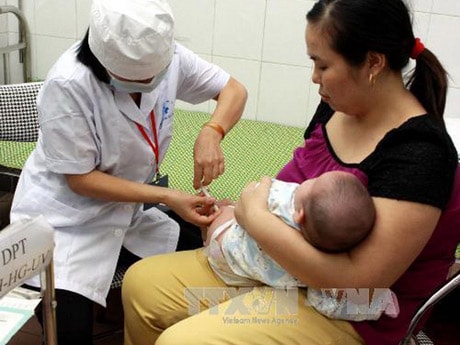Continue to inject Quinvaxem vaccine nationwide
Last October, a number of provinces and cities re-initiated Quinvaxem vaccination in their localities and are expected to resume nationwide vaccination in November.
However, right after this vaccine was introduced nationwide, many incidents continued to occur, causing many parents to continue to raise doubts.
 |
| Medical staff vaccinate children with Quinvaxem vaccine in Hue ward, Hai Ba Trung district, Hanoi. (Photo: Duong Ngoc/VNA) |
Regarding the above information, the reporter had an interview with Associate Professor Tran Dac Phu - Director of the Department of Preventive Medicine to clarify this issue.
- After more than half a year of stopping use due to many incidents, can you tell us about the current situation of Quinvaxem vaccine deployment nationwide?
Associate Professor Tran Dac Phu: Implementing the direction of Deputy Prime Minister Nguyen Thien Nhan on allowing the Ministry of Health to continue using Quinvaxem vaccine in Expanded Immunization and improving the quality of vaccination work. On August 21, 2013, the Ministry of Health issued a Plan to strengthen vaccination safety work along with Decision No. 3029/QD-BYT of the Minister of Health.
During the period from late October to early November, according to reports from the Department of Health of provinces and cities, 36 provinces and cities have re-deployed Quinvaxem vaccine.
Currently, in 4 regions including the North (15 provinces and cities), the Central region (5 provinces and cities), the Central Highlands region (4 provinces), and the South (12 provinces and cities), about 300,000 doses of vaccine have been injected.
- Could you tell us how many children nationwide need to be vaccinated each month?
Associate Professor Tran Dac Phu: It can be said that the implementation of Quinvaxem vaccination in the expanded immunization program in recent times has received great attention, not only from parents and health workers but also from the whole community.
Currently, the country has about 17,000 vaccination points, including fixed vaccination points and mobile vaccination points.
According to health sector statistics, about 400,000 children are vaccinated each month.
- Sir, with such a large number of children vaccinated, especially recently there have been many cases of reactions after Quinvaxem vaccination, including last week in Quang Tri province, a child died after being vaccinated with this vaccine, making many parents continue to worry. How does the Ministry of Health explain the above information?
Associate Professor Tran Dac Phu: Due to the importance of re-injecting Quinvaxem vaccine this time, the Ministry of Health has closely directed the vaccination process of localities to best ensure the safety of children.
Through monitoring by the health sector of the provinces as well as the Institutes of Hygiene and Epidemiology, it is shown that during the vaccination process, there were some cases of post-vaccination reactions, but post-vaccination reactions were recorded.
The reactions after the injection were mainly crying, swelling at the injection site, fever, and a few cases of cyanosis and convulsions, but not serious. Those babies were all monitored, cared for, and promptly treated at the medical facility. Currently, all children are stable and have been discharged from the hospital.
The Ministry of Health has determined that these are common reactions after Quinvaxem vaccination, and these reactions are within the statistical limits of the World Health Organization. In particular, most recently, a child died five days after vaccination in Huong Hoa district, Quang Tri. The case was investigated, evaluated, and determined to be due to severe pneumonia, unrelated to vaccination.
- At the end of September, the Ministry of Health held an online conference to deploy the Plan to enhance vaccination safety to localities. Could you tell us what the inspection results were after more than a month?
Associate Professor Tran Dac Phu: Recently, the Ministry of Health has taken drastic measures and proposed many solutions to tighten the work of ensuring vaccination safety, avoiding possible errors in vaccination practices such as conducting comprehensive inspections and checks of vaccination facilities nationwide.
Up to now, after more than two months of strongly implementing the Plan to strengthen vaccination safety, localities across the country have inspected and checked 11,714 vaccination points (reaching 83%), of which 8,336 points are eligible for vaccination (reaching 90%).
The Ministry of Health has directed localities to continue to conduct inspections, and delegations from the Institutes of Hygiene and Epidemiology/Pasteur are also going to localities to inspect and guide localities to effectively implement activities to ensure vaccination safety.
- With a huge number of more than 17,000 vaccination sites nationwide, vaccination safety is of great concern to many people. So, to do this well, can you tell us how the Ministry of Health's upcoming strategy will be implemented?
Associate Professor Tran Dac Phu: To do this job well, I find that the attention, direction, inspection, supervision and investment of the Government at all levels are very important.
We also hope that mothers continue to vaccinate their children fully and on schedule, creating favorable conditions to help health workers and the health sector complete their tasks, and at the same time being able to monitor and give feedback so that health workers can perform better and better.
To ensure safe vaccination for children, as well as to create trust for the community, the Ministry of Health will continue to direct localities to continue to review all vaccination sites in the area, overcome existing problems, only qualified vaccination sites are allowed to conduct vaccination. Facilities that do not meet the conditions must complete all conditions before conducting vaccination.
In addition, the health sector also organized training on screening and supported vaccination sites in pre-vaccination screening. It also instructed mothers to monitor and care for their children after vaccination, closely monitor and promptly handle post-vaccination reactions to ensure children are vaccinated safely./.
According to VNA






